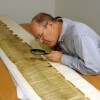This excerpt was originally published by LDS Living in August 2018 and is being shared again in honor of the anniversary of the night the angel Moroni appeared to Joseph Smith.
President Boyd K. Packer taught that divine revelation may come in various ways: “The Lord reveals His will through dreams and visions, visitations, through angels, through His own voice, and through the voice of His servants. ‘Whether by mine own voice,’ He said, ‘or by the voice of my servants, it is the same.”1 Depending on the needs of mortals and according to the will of the Lord, angels communicate with mortals in a variety of ways—by a visitation, by a voice, by thoughts, by feelings, or in other ways. . . .
Many visitations from the spirit world are from relatives, including grandparents, parents, and siblings. Deceased friends, too, may visit loved ones with messages from God. President Joseph F. Smith wrote, “Our fathers and mothers, brothers, sisters and friends who have passed away from this earth, having been faithful, and worthy to enjoy these rights and privileges, may have a mission given them to visit their relatives and friends upon the earth again, bringing from the divine Presence messages of love, of warning, or reproof and instruction, to those whom they had learned to love in the flesh.”2 President Smith then gave an example of Sister Cannon, who “can return and visit her friends,” but he added, it had to “be in accordance with the wisdom of the Almighty” because “there are laws to which they who are in the Paradise of God must be subject, as well as laws to which we are subject.”3
1. Angels can communicate through dreams and visions.
Is there a difference between a vision and an inspired dream? Elder James E. Talmage explained: “In general, visions are manifested to the waking senses whilst dreams are given during sleep. In the vision, however, the senses may be so affected as to render the person practically unconscious, at least oblivious to ordinary occurrences, while he is able to discern the heavenly manifestation. In the earlier dispensations, the Lord frequently communicated through dreams and visions, oftentimes revealing to prophets the events of the future even to the latest generations.”4 Examples of angels communicating with persons in dreams include Jacob (“And the angel of God spake unto me in a dream”; Genesis 31:11), and Joseph (“the angel appeared unto him in a dream”; Matthew 1:20; 2:13, 19).
Some individuals may tend to minimize the significance of dreams originating from God. Some indicate that a vision is greater or more important, but both President Spencer W. Kimball and President Harold B. Lee taught regarding the importance of God-inspired dreams.5 Even as various persons, both men and women, from the Bible and Book of Mormon had God-inspired dreams and visions that included angels, both men and women in the last days may also experience heavenly communications. Such was the testimony of the prophet Joel (Joel 2:28; see also Acts 2:17). When he visited the young Joseph Smith on the evening of September 21, 1823, the angel Moroni cited Joel 2:28–32 and stated that the words of these verses would soon be fulfilled (see Joseph Smith–History 1:41).
2. Angels communicate with mortals by speaking to them.
We know that angels communicate with mortals by speaking to them. For example, “the angel of the Lord called unto [Abraham] out of heaven . . . the angel of the Lord called unto Abraham out of heaven the second time . . .” (Genesis 22:11, 15). Alma 12:29 states that God “sent angels to converse with them.” President Brigham Young told his audience that “there are persons in this congregation that will converse with angels just as freely as we converse with each other.”6
President Boyd K. Packer, citing passages from the Book of Mormon, explained: “We are told that ‘angels speak by the power of the Holy Ghost.’ We are even told that when we speak by the power of the Holy Ghost, we ‘speak with the tongue [or in the same language] of angels.’ (2 Nephi 31:13; 2 Nephi 32:2.)”7 President Packer further explained: “Nephi explained that angels speak by the power of the Holy Ghost, and you can speak with the tongue of angels, which simply means that you can speak with the power of the Holy Ghost. It will be quiet. It will be invisible. There will not be a dove. There will not be cloven tongues of fire. But the power will be there.”8
On one occasion, Elder Parley P. Pratt was seeking men to join Zion’s Camp; he had traveled for many hours by carriage, ridden through the night, and finally stopped to rest at noon. He loosened the horse to permit it to graze, and then he fell asleep. Because of his exhaustion, he later recorded, he “might have lain in a state of oblivion till the shades of night had gathered about me. . . . I had only slept a few moments till the horse had grazed sufficiently, when a voice, more loud and shrill than I had ever before heard, fell on my ear, and thrilled through every part of my system; it said: ‘Parley, it is time to be up and on your journey.’” Elder Pratt quickly responded, found his horse, and traveled on until he rejoined Zion’s Camp. When he told Joseph Smith of this experience, the Prophet explained that it was “the angel of the Lord who went before the camp” who woke him.9
3. Angels communicate with thoughts or feelings.
In addition to angels’ visitations and conversations, angels may communicate with thoughts or by feelings. Elder Dallin H. Oaks summarized: “The ministering of angels can also be unseen. Angelic messages can be delivered by a voice or merely by thoughts or feelings communicated to the mind. President John Taylor described ‘the action of the angels, or messengers of God, upon our minds, so that the heart can conceive . . . revelations from the eternal world’ (The Gospel Kingdom, sel. G. Homer Durham [1943], 31).
“Nephi described three manifestations of the ministering of angels when he reminded his rebellious brothers that (1) they had ‘seen an angel,’ (2) they had ‘heard his voice from time to time,’ and (3) also that an angel had ‘spoken unto [them] in a still small voice’ though they were ‘past feeling’ and ‘could not feel his words’ (1 Nephi 17:45) . . . Most angelic communications are felt or heard rather than seen.”10
As Elder Oaks attested, mortals can feel the words of an angel. The full text of 1 Nephi 17:45 states: “Ye are swift to do iniquity but slow to remember the Lord your God. Ye have seen an angel, and he spake unto you; yea, ye have heard his voice from time to time; and he hath spoken unto you in a still small voice, but ye were past feeling, that ye could not feel his words; wherefore, he has spoken unto you like unto the voice of thunder, which did cause the earth to shake as if it were to divide asunder” (italics added). The concept of feeling an angel’s words may be indicated in the following passage from latter-day scripture: “Which our forefathers have awaited with anxious expectation to be revealed in the last times, which their minds were pointed to by the angels, as held in reserve for the fulness of their glory” (D&C 121:27).
4. Angels can give impressions.
Christopher Columbus was guided by an angel from the Lord, who “gave him deep impressions,” taught Elder Orson Hyde on America’s Independence Day in 1854: “[An] angel was with Columbus, and gave him deep impressions, by dreams and by visions, respecting this New World. Trammelled by poverty and by an unpopular cause, yet his persevering and unyielding heart would not allow an obstacle in his way too great for him to overcome; and the angel of God helped him.”11
5. Angels can communicate through pure intelligence.
Other Church authorities provide additional understanding regarding spiritual communications with angels. President Boyd K. Packer, citing the Prophet Joseph Smith, referred to “pure intelligence,” which one may experience when communicating with an angel: “Should an angel converse with you, neither you nor he would be confined to corporeal sight or sound in order to communicate. For there is that spiritual process described by the Prophet Joseph by which pure intelligence can flow into our minds and by which we can know what we need to know without either the effort of study or the passage of time, because that is revelation.”12
Laws govern angels and their communications.
Angels’ visitations and communications must be authorized by those authorities who are assigned to direct such work. All of God’s messengers, whether they are resurrected or translated beings, unembodied or disembodied spirits, or mortals must comply with God’s laws relating to communication among the different spheres of existence. The Prophet Joseph Smith taught that “the organization of the spiritual and heavenly worlds, and of spiritual and heavenly beings, was agreeable to the most perfect order and harmony: their limits and bounds were fixed irrevocably.”13 Without order and divine organization among the spheres, there would exist chaos and confusion. Elder Orson F. Whitney explained: “God’s house is a house of order, and the spirit world is a room in that house. This being the case, it is only reasonable to conclude that before anything important or unusual can take place there, the Master of the Mansion must first give consent. Otherwise confusion would prevail, and the divine purpose for which the veil was dropped between the two worlds might be thwarted. . . . Permission from the Great Father would have to be obtained before one of his children, either an unembodied or a disembodied spirit, could make itself manifest to mortals.”14
Lead image: Shutterstock
Although angels are a vital part of Latter-day Saint history and doctrine, their roles and purposes are often misunderstood. In this inspiring volume, author Donald W. Parry discusses in a clear and understandable waywhat we can learn from the scriptures and from modern prophets and apostles about angels and their missions. Available now at DeseretBook.com.
- “Personal Revelation: The Gift, the Test, and the Promise,” Ensign, Nov. 1994, 61; see also N. Eldon Tanner, “Warnings from Outer Space,” Ensign, Nov. 1972, 26: “Since the very beginning of time we have a record of God’s messages to man, either by personal appearance, by angels, by direct revelation, by visions, by dreams, or by inspiration.”
- Gospel Doctrine, 436.
- Gospel Doctrine, 436.
- Articles of Faith, 205.
- Kimball, “The Cause Is Just and Worthy,” Ensign, May 1974, 119; Lee, Stand Ye in Holy Places, 142.
- Journal of Discourses, 5:258.
- “Personal Revelation: The Gift, the Test, and the Promise,” Ensign, Nov. 1994, 59.
- “The Gift of the Holy Ghost: What Every Member Should Know,” Ensign, Aug. 2006, 49–50.
- Autobiography, 93–94.
- “The Aaronic Priesthood and the Sacrament,” Ensign, Nov. 1998, 38–39.
- Journal of Discourses, 6:368.
- Mine Errand from the Lord, 125.
- Teachings of the Prophet Joseph Smith, 325.
- Saturday Night Thoughts, 307.






